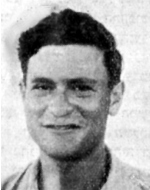Gelbard, David
Son of Sonia and Moshe, was born on March 15, 1922 in Lodz, Poland, and immigrated to Israel in 1938 as part of the Youth Aliyah. He received a high school education and was a trainee in the son of Shemen youth village, who called for work and agriculture. Upon completion of his studies he was one of the founders of the Nitzanim group in the south and Bunia. David’s life on the kibbutz was tenfold. He asked for the truth and cruelly demanded of himself loyalty to fulfillment and co-existence. He was always accompanied by anxiety about the fate of the people and the pioneering movement within it. In the kibbutz he accepted all the daily chastity. In a creative work life, in the field of clover, near the concrete mixer, in the orchard, he felt like a constructive person. Was a man of friends despite his tendency to be alone, and gathered around him a group of friends with whom he spent his free time discussing the questions of the hour. At the beginning of the War of Independence, he wrote in one of his letters: “A description of this difficult struggle abroad in such black colors is liable to impede us at the most important point of the struggle, in Aliya, which is the cornerstone of the realization of our idea.” After the progress of the Egyptian column near Ashdod was halted, Kibbutz Nitzanim remained behind. The Egyptians understood that this point could serve as a basis for the activity of our forces in the rear and therefore concentrated considerable force in order to conquer it. The Egyptian attack was launched on June 7, 1948. In the early hours of the night, the agriculture was severely shelled, and in the morning the infantry assault began, but this was stopped by the defenders. The Egyptians increased the shelling and even activated planes that bombed the agriculture and caused heavy damage. Under this cover, Egyptian infantry and armored forces advanced and managed to penetrate the agriculture and take control of it. In this battle David fell on the 29th of Iyar 5708 (7.6.1948) and was brought to eternal rest in the cemetery at Nitzanim.
